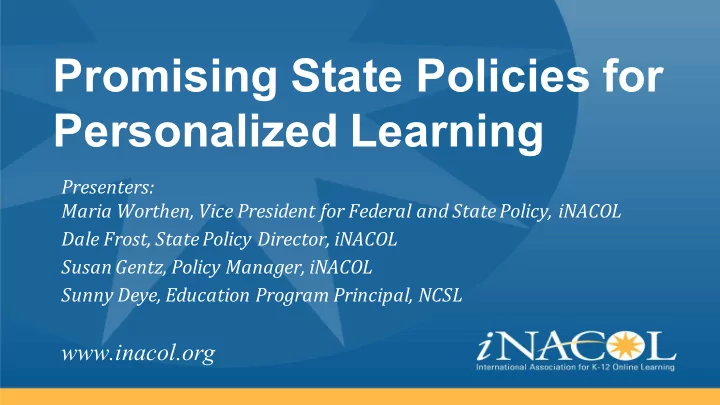

Promising State Policies for Personalized Learning Presenters: Maria Worthen, Vice President for Federal and State Policy, iNACOL Dale Frost, State Policy Director, iNACOL Susan Gentz, Policy Manager, iNACOL Sunny Deye, Education Program Principal, NCSL www.inacol.org
Maria Worthen Dale Frost Susan Gentz Sunny Deye Vice President for State Policy Director Policy Manager Program Principal, Federal & State iNACOL iNACOL Education Policy NCSL iNACOL
About NCSL ◻ Instrumentality of all 50 state and territorial legislatures ◻ Bipartisan ◻ Provides research, technical assistance and opportunities to exchange ideas ◻ Advocates on behalf of legislatures before the federal government NCSL is committed to the success of state legislators and staff. Founded in 1975, we are a respected bipartisan organization providing states support, ideas, connections and a strong voice on Capitol Hill.
NCSL Education Program Key work groups: ◻ The NCSL Standing Committee on Education ◻ Education Committee Chairs ◻ The Legislative Education Staff Network NCSL Resources on Personalized Learning ◻ http://www.ncsl.org/research/education/hot-topics-in- digital-and-competency-based-learning.aspx
● State policy strategies to scale personalized learning ● Multiple entry points ● Specific state examples ● Can be tailored to each state’s unique policy landscape and education system
Students attending schools using personalized learning models “made gains...significantly greater than a comparison group made up of similar students...” -RAND, 2015
2012
2016
Every Student Succeeds Act (ESSA) December 10, 2015
Continuum of Promising State Policies for Personalized Learning Policies for States Policies for States Comprehensive Statewide Policy Approach Getting Started Moving Forward CBE Task Forces Proficiency-Based Diplomas Common Performance Credit Flexibility Assessments Modernized Systems of Innovation Zones Assessments Building Educator Capacity + Professional Judgement Pilot Programs State Initiatives to Build Local Capacity Multiple Pathways Level of State Involvement
Continuum of Promising State Policies for Personalized Learning Policies for States Policies for States Comprehensive Statewide Policy Approach Getting Started Moving Forward CBE Task Forces Proficiency-Based Diplomas Common Performance Credit Flexibility Assessments Modernized Systems of Innovation Zones Assessments Building Educator Capacity + Professional Judgement Pilot Programs State Initiatives to Build Local Capacity Multiple Pathways Level of State Involvement
Competency-Based Education Task Forces Develop Identify Create a understanding policy issues space for and best of competency dialogue education practices
Competency-Based Education Task Forces Iowa Iowa
Credit Flexibility Waivers Credit Flexibility Redesign West Oregon New Virginia Hampshire
Innovation Zones • Offer waivers and exemptions from state regulations and statutes • Support practitioners implementing new learning models • Identify policy barriers to innovation
Innovation Zones Colorado Kentucky
Pilot Programs Launch small-scale, Facilitate short-term programs sharing and Build increased to determine how to scaling of best understanding of go to scale practices transformation
Pilot Programs Ohio
Multiple Pathways Create distinct, equally rigorous paths for students to pursue their interests and gain real-world skills, knowledge and experiences.
Multiple Pathways New York
Continuum of Promising State Policies for Personalized Learning Policies for States Policies for States Comprehensive Statewide Policy Approach Getting Started Moving Forward CBE Task Forces Proficiency-Based Diplomas Common Performance Credit Flexibility Assessments Modernized Systems of Innovation Zones Assessments Building Educator Capacity + Professional Judgement Pilot Programs State Initiatives to Build Local Capacity Multiple Pathways Level of State Involvement
Proficiency-Based Diplomas Graduation decisions based on demonstrated proficiency rather than on seat-time credits.
Proficiency-Based Diplomas Vermont Maine Arizona
Modernizing Systems of Assessments ESSA allows states to use the following types of assessments: – Competency-based – Instructionally-embedded – Interim – Cumulative year-end – Computer-adaptive – Performance-based
Modernizing Systems of Assessments Performance Assessment for Competency Education (PACE) New Hampshire
State Initiatives to Build Local Capacity Offering Providing technical Information assistance Leveraging partnerships Creating Facilitating specialized peer learning training
State Initiatives to Build Local Capacity Arkansas
Continuum of Promising State Policies for Personalized Learning Policies for States Policies for States Comprehensive Statewide Policy Approach Getting Started Moving Forward CBE Task Forces Proficiency-Based Diplomas Common Performance Credit Flexibility Assessments Modernized Systems of Innovation Zones Assessments Building Educator Capacity + Professional Judgement Pilot Programs State Initiatives to Build Local Capacity Multiple Pathways Level of State Involvement
Vermont’s Comprehensive Policy Approach • Proficiency-based graduation requirements Vermont • Personalized learning plans • Rethinking systems of assessments • Accountability and continuous improvement • Multiple, flexible pathways • Educator and school leader development
Future Issues
“We aren’t done innovating until 100% of our students are graduating.” - Ty Cesene, Co-Director, Bronx Arena High School
For information about state legislative activity on personalized learning, or to get involved with NCSL committees: Sunny Deye Program Principal, Education National Conference of State Legislatures sunny.deye@ncsl.org 303-856-1469
Q&A
Contact Information ❖ Maria Worthen, VP, Federal & State Policy, iNACOL mworthen@inacol.org ❖ Dale Frost, State Policy Director, iNACOL dfrost@inacol.org ❖ Susan Gentz, Policy Manager, iNACOL sgentz@inacol.org ❖ Sunny Deye, Program Principal, Education, NCSL sunny.deye@ncsl.org
Recommend
More recommend